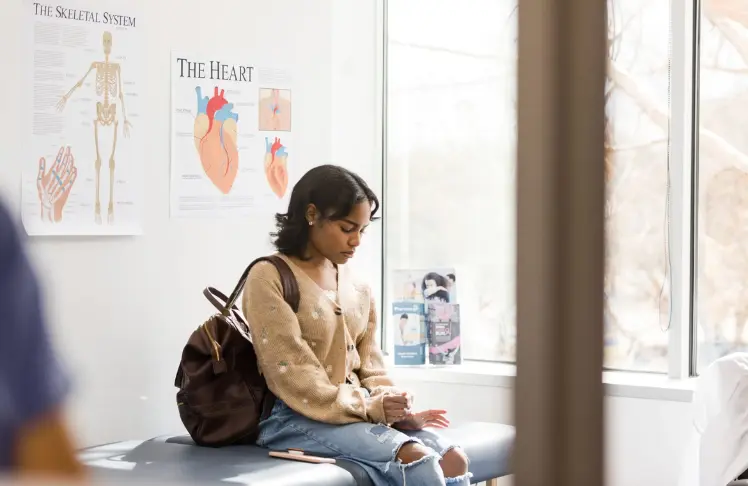
“I have a lot of anxiety with my diabetes … it’s extremely traumatic,” she says. “I have PTSD from the sudden cardiac arrest.”
Adults like Wilson who live with a disability report higher rates of delayed access to medical equipment and supplies than adults without a disability, a new Urban Institute report finds. This contributes to worsening health outcomes, chronic pain, and mental health issues.
The analysis comes from the Institute’s June 2022 Health Reform Monitoring Survey of nearly 10,000 adults ages 18-64. And researchers who spearheaded the report told Word In Black the findings are not surprising.
“What is surprising… there’s not a lot of national data on barriers adults with disabilities face to get medical equipment, supplies, and other home and community-based services,” Michael Karpman, Principal Research Associate in the Health Policy Center at the Urban Institute, says. “This is filling an important data gap that is really not covered by federal surveys.”
Some of the most common types of equipment and supplies that were delayed or not received included eyeglasses, breathing equipment, mobility equipment, diabetes supplies, and hearing aids. And adults with a disability were six times more likely than non-disabled adults to say they experienced delayed physical and occupational therapy.
Beyond the data are the people living with and experiencing firsthand complications and delays in the health care system.
With multiple health conditions to manage, Wilson, like many Americans, is left to navigate a complicated health care system. And as a Black woman, she faces additional inequities. For example, when she explains to physicians that she’s in pain, they assume she can handle it since she’s lived with diabetes since childhood. And Wilson says anytime she goes to the hospital, even if it’s not related to her diabetes, it’s automatically blamed on the autoimmune disease.
“It’s a whole ball of frustration that comes along with diabetes,” she says.
After the sudden cardiac arrest, she was put on disability and assigned Medicaid insurance. Three years ago, she got married and was put on her husband’s UnitedHealthcare insurance.
A Tale of Two Insurances
“Medicaid is like a catch-22,” she says. “I can see the difference between having Medicaid and having UnitedHealthcare. It’s sad, but you’re literally treated two different ways.”
Prior to getting UnitedHealthcare, Wilson had ongoing issues getting insulin. And she faced similar problems when accessing her prescription heart medication. Medicaid refused to refill her heart medication even though she ran out. However, a CVS program refilled it for 10 days until her insurance company would refill the prescription.
“It’s almost like the insurance company was deciding what I needed and what I didn’t need,” Wilson says. “But the insurance company is not here with this diagnosis with me.”
Adults living with a disability and insured with Medicare or Medicaid were more likely to report delayed or unmet needs for medical supplies, like prescription drugs, than those with private insurance, the Urban Institute report states.
“Medicaid is the payer of last resort,” Karpman says.
But he says having insurance is better than having nothing.
“There’s no question that having health insurance is helpful. People gain much more protection from having insurance than being uninsured,” Karpman says. “The problem is there is still a large number of gaps in coverage. Too much complexity in health insurance. And there’s often a lack of transparency.”
With so much convoluted information about insurance plans and the health care system, it can be difficult to know where to start. Jackie Pilgrim, a representative of the National Black Disability Coalition, has spent more than two decades navigating the health care system for her son.
Pilgrims’ son Hunter, now 24, was born 7 months prematurely. When he was 1-week old, he had one-third of his small intestine removed. Months later, he developed lung disease after being intubated in the NICU. She says he came home with a colostomy bag and now lives with autism and other intellectual disabilities.
When Hunter was 4-months-old, Pilgrim found out her existing insurance didn’t pay for anything. But she was able to get emergency Medicaid — which paid for those initial months of hospital bills. Medicaid continues to cover his medical bills.
Despite all the challenges, she says she never went into medical debt. Additionally, having a good support system has significantly helped her navigate and access everything from insurance coverage to prescription drugs to specialized physicians.
“I know my situation is probably different from a lot of people,” Pilgrim says. “But because I’m deep into the disability world, I’ve been very informed and savvy about getting things done.”
The Power of Informed Advocacy
As a child, Wilson was constantly told her diabetes diagnosis was a death sentence. With doctors putting an expiration date on her life — telling her she wouldn’t live past 15, then 18, then 21. Now as an advocate for people living with diabetes and chronic disease, she’s adamant that “diabetes is not a death sentence.”
“Give yourself some grace,” she says when asked what she would tell a parent or a child living with diabetes. Wilson recognizes that it’s not easy and it is a life-changing diagnosis, but she emphasizes that it’s important to live and not just survive.
Pilgrim, whose son is nonverbal, encourages parents not to take no for an answer. Something that helped her navigate the health care system, after her husband left when Hunter was 9-months old, was being assigned a social worker. Now, she encourages parents to seek out other parents who have gone through the system. And she emphasizes to parents the importance of being well informed about their child’s diagnosis.
“Initially, we have to get past the pain of discovering that our children are going to be disabled,” Pilgrim says. “You need to go into this with a healthy mind.”


